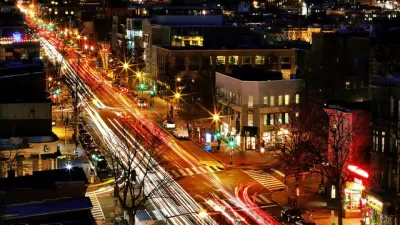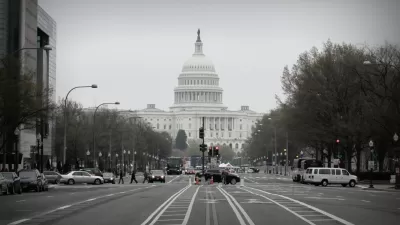Advocates say traffic safety data collection practices in Washington, D.C. don't meet national standards. They also say it will be hard for the District to meet its vision zero goal by 2024 if the problem persists.
Martin Di Caro delves into the prospect of achieving a vision zero target to eliminate all traffic fatalities by 2024. After describing the conditions of a particularly dangerous section of the bicycle track that runs down the media of Pennsylvania Avenue, Di Caro notes that the example indicates a larger issue: that Washington, D.C. lacks the data to achieve its vision zero goal.
"In a policy paper distributed to the mayor’s office, D.C. Council, DDOT, MPD, and Department of Motor Vehicles, the Washington Area Bicyclist Association (WABA) outlined the inadequacies with the police department’s current crash reporting form, which does not meet standards established by multiple federal safety agencies, known as Model Minimum Uniform Crash Criteria (MMUCC)," reports Di Caro.
WABA is advocating for D.C. to "follow the lead of other Vision Zero cities to collect comprehensive data, publicize the location of crashes on a weekly basis, and integrate crash reports with medical records to determine why certain roads and intersections lead to the most serious injuries."
District Department of Transportation has data collection on its to-do list, with one of four working groups working to implement vision zero policies focuses specifically on data.
FULL STORY: D.C. Lacks The Crash Data It Needs To Pursue 'Vision Zero'

Planetizen Federal Action Tracker
A weekly monitor of how Trump’s orders and actions are impacting planners and planning in America.

Congressman Proposes Bill to Rename DC Metro “Trump Train”
The Make Autorail Great Again Act would withhold federal funding to the system until the Washington Metropolitan Area Transit Authority (WMATA), rebrands as the Washington Metropolitan Authority for Greater Access (WMAGA).

The Simple Legislative Tool Transforming Vacant Downtowns
In California, Michigan and Georgia, an easy win is bringing dollars — and delight — back to city centers.

The States Losing Rural Delivery Rooms at an Alarming Pace
In some states, as few as 9% of rural hospitals still deliver babies. As a result, rising pre-term births, no adequate pre-term care and harrowing close calls are a growing reality.

The Small South Asian Republic Going all in on EVs
Thanks to one simple policy change less than five years ago, 65% of new cars in this Himalayan country are now electric.

DC Backpedals on Bike Lane Protection, Swaps Barriers for Paint
Citing aesthetic concerns, the city is removing the concrete barriers and flexposts that once separated Arizona Avenue cyclists from motor vehicles.
Urban Design for Planners 1: Software Tools
This six-course series explores essential urban design concepts using open source software and equips planners with the tools they need to participate fully in the urban design process.
Planning for Universal Design
Learn the tools for implementing Universal Design in planning regulations.
Smith Gee Studio
City of Charlotte
City of Camden Redevelopment Agency
City of Astoria
Transportation Research & Education Center (TREC) at Portland State University
US High Speed Rail Association
City of Camden Redevelopment Agency
Municipality of Princeton (NJ)





























